Gerry Adams's Blog, page 77
March 8, 2012
Ní neart go cur le chéile - Unity is strength
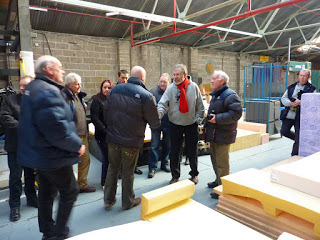
In Vita Cortex Factory
This blog travelled to Cork to meet with workers from the Vita Cortex company early on Thursday morning. Thirty two workers were paid off just before Christmas. They have occupied the factory since then. Eighty four days in all. Some of the workers showed me around. It's an old plant. Cold and drafty and very basic but for some of the workers it was their livelihood for 40 years.
The owner Jack Ronan and the management committed to paying a redundancy package of 2.9 weeks, that is, two weeks statutory and 0.9 gratis per year of employment.
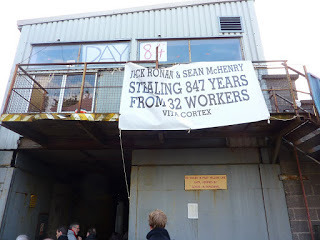
Other Vita Cortex workers in Navan in 2007 and Dublin in 2008 and workers laid off in Cork previously were paid this amount. But not this group of workers. The owner claims he can't afford it. The workers don't believe him. Neither do I.
The workers sit-in has attracted widespread support in Cork, across the island and from overseas.
There have been efforts to resolve the dispute, including with the Labour Relations Commission, but thus far without success.
The state has paid the two weeks statutory payment. But Labour Minister Joan Burton has warned that what money the workers get will be clawed back by her department as part payment of the two weeks redundancy that has been paid.
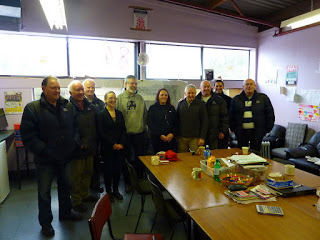
Last week the workers were offered half of the outstanding money due them from Vita Cortex. They rejected that, and discussions between their union and the shareholders continues.
Regular readers of this blog will be reminded of the Visteon dispute in west Belfast in March 2009. At that time Visteon, which was established by Ford and supplied parts to the company, closed its west Belfast and two others in Britain with the loss of hundreds of jobs.
Visteon workers in west Belfast, with the support of the local community, successfully took a stand against the injustice of the closure and the efforts of a huge multi-national company to steal from them many of the pension and other rights they were entitled to under hard fought for agreements.
Six weeks after they began their occupation the workers marched out of the plant united and proud. They understood the importance of - Ní neart go cur le chéile - Unity is strength. Because of that they secured from the Visteon Corporation a compensation package, which while not as fair as it should have been was much, much better than Visteon intended it to be.
Serious questions still remain about the behaviour of the Ford Motor Company and of the Visteon Management about the transfer of pension schemes and company assets. The campaign for justice for Visteon workers, and the effort to uncover the full facts surrounding the decisions taken by the company which led to the closure of the plant, goes on.
So there was a sense of déjà vu when I sat down with the Vita Cortex workers and listened to their account of years of dedicated service to the company and then the manner in which the company then treated them.
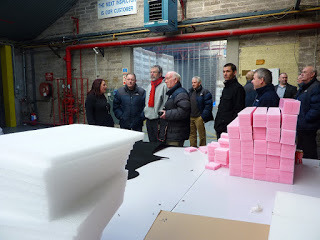
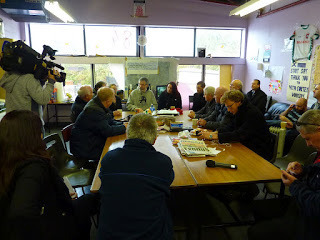
One worker – Helen Crowley – proudly showed me the large piece of foam which she sleeps on each night she stays in the factory. I told her it reminded me of the mattresses the men in the H Blocks slept on during the protest.
The local shinners have been hugely supportive of the workers and they acknowledge that. I was there to extend our solidarity and support.
It is shameful the way the Vita Cortex workers are being treated and what they and their families are going through to get what are very modest entitlements.
At the same time it's very uplifting to see the spirit of the workers and to know that they have significant support in Cork, across the island and abroad.
Vita Cortex owner Jack Ronan is behaving in a most unpatriotic way. He should honour his pledge to these workers. I don't begrudge him his wealth but it was created by people like those who are in occupation of the Vita Cortex factory. And they deserve their rights and entitlements.
I also think it is vitally important that what is happening here never happens again to any other workforce. It is very clear that there is not sufficient legislative protection for workers in this state.
While Sinn Féin TDs Jonathon O Brien and Peadar Toibin are looking at bringing in legislation this is really a matter for the government. And we intend to press them on that.
In the meantime if you have a minute write a letter of support to the workers. They will put it up on the walls of their temporary canteen to join the many other messages of solidarity they have received.
Send it to Protesting Workers, Vita Cortex factory, Kinsale Road. Cork.
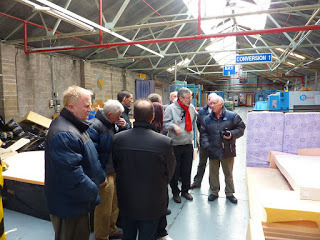
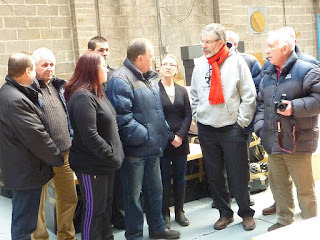

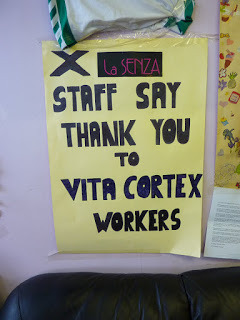

Published on March 08, 2012 17:08
March 7, 2012
lá na Gaeilge sa Dáil
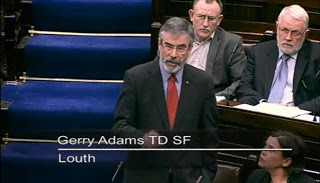
Seo muid ag caint tré ghaeilge inniu agus fáiltíom roimh an t-am atá againn ins an Dáil agus molaim an Teachta Dála, Aengus Ó Snodaigh de bharr an rún seo a mholadh mar chuid de Sheachtain na Gaeilge.
Bhí an chuid is mó d'imeachtaí den Chéad Dáil tré mheán na Gaeilge agus ba chóir dúinn leanúint le seo mar ábhar nádúrtha agus rialta.
Buíochas ar son iad siúd a d'oibrigh in amannta deacra agus teaghlaigh a chur an Ghaeilge chun cinn. Molaim Raidio na Gaeltachta, TG4, Raidio Fáilte agus Raidió na Life ina measc.
Beatha teanga í a labhairt. Caitear seod nuair atá muid ag iarraidh an seod sin a thaispeáint ach caithfear an seod sin a chaomhnú mar sheod chultúrtha agus é a chaitheamh go bródúil.
Dúirt mise:
"Mar is eol don Aire, is ábhar suim faoi leithe í an Ghaeilge agam.
Beatha teanga í a labhairt agus cuireann sé an-sásaimh orm an borradh atá tagtha i líon na Gaeilgeoirí sa tír, cuid mhaith dó sin de dheascadh gluaiseacht na gaeilscoileanna, na naoinraí agus tuismitheoirí dílis.
Cuireann sé gliondair croí orm amharc ar an méid daoine óga go háirithe atá suim acu sa ghaeilge, agus atá páirteach in eagraíochtaí ar nós Conradh na Gaeilge.
Ach ní mór dúinn a bheith airdeallach nach dtiocfaidh meathú ar bhfás an teanga, ach go háirithe leis an mhéid sin duine atá ina ndeoraí thar sáile.
Beidh impleachtaí ollmhóra ag na ciorruithe oideachas a bhí sa bhuiséad ar ghlúnta de pháistí gaeltachta, is todhchaí an teanga má chailltear múinteoirí iontu.
Tá ról tabhachtach ó thaobh cur chun cinn an Ghaeilge, agus ó thaobh maoirseacht An Acht na dTeangacha Oifigúla ag an gCoimisinéir Teanga.
Níl aon fianaise go mbeadh aon sábhail airgead ann idir ann chomhnascadh le h-oifig an Ombudsman.
Iarraim ar an t-Aire, an bhfuil sé d'intinn aon aird a thabhairt ar na h-aighneachtaí ar athbhreithniú acht na teangacha oifigiúla go gcoimeadfar oifig an choimisinéira mar oifig neamhspleách?
Ni mór dom a rá freisin, go bhfuil tabhacht faoi leith ag na Gaeltachtaí ó thaobh caomhnú agus ó thaobh blas agus saibhreas na teanga.
Ar an ábhar sin, ba mhaith liom iarraidh ar an tAire, cathain a bheidh na "Heads of Bill" do Bille na Gaeltachta aontaithe ag an rialtas, agus cathain a bheidh sé á fhoilsiú?
Tuigim go bhfuil post príomhfheidhmeannach an Údarás fógraithe faoi dheireadh, ach tá go leor imní ar phobail an Ghaeltacht nach mbeidh an seans acu Boird an Údarás a thoghadh go daonlathach arís, mar a mba chóir go mbeadh i ndán dóibh.
An mbeadh an t-Aire sásta ráiteas a dheánamh ar conas mar a thoghfar, nó a roghnófar an bhoird as seo amach?
Tá a fhios agam gur ábhar imní é chomh maith go bhfuil go leor ciorraithe ar bhuiseád capiteal an údarás.
De bharr ciorraithe ar bhuiséad caipteal an údarás d'fhéadfadh go mbeadh an tionchar aige sin ag feidhmiúcháin an údaráis mar eagraíocht fiontair. Tá gá le h-ionadaí don Údarás a bheith tofa go daonlathach i dtoghcháin seachas a bheith ceaptha.
Ar ábhar an samhail nua maoinithe dona heagraíochtaí bun mhaoinithe Gaeilge is léir gur gá don Aire oibriú i gcomhpháirtaíocht leis an Aire Cultúr agus Fóillíochta sa gchomhthionóil, Caral Ní Chuilin, chun an imní atá orthu siúd in earnáil phobail na gaeilge agus an taithí atá ag cuid mhaith acu a thogáil ar boird.
Chomh maith le sin iarraim ar an t-Aire tacaíocht a thabhairt don obair atá á dheánamh sa gchomhthionóil chun an Ghaeilge a chur chun cinn. Tá Feachtas Líofa 2015 a fógraíodh le tamall anuas ina measc agus molaim Clár Líofa 2015 a scaipeadh trasna an stat seo fosta. Is cuis áthais é dom go bhfuil daoine ón dá thraidisiún tar éis síniú suas don feachtas Líofa 2015.
Iarraim ar an rialtas anseo a fhógru go seasóidh siad le geallúint Rialtas na Breataine leis an gheallúint Acht Teanga iomlán-mhaoinithe agus ceartbhunaithe a thabhairt isteach.
Chomh maith le tacaíocht substantiúil a thaispeáint i dtreo aitheantas oifigiúil agus stádas a thabhairt don Ghaeilge i gcúirteanna na sé chontae.
Glacaim an tseans seo le Bród.ie a mholadh ina bhfuil Bernard Dunne agus daoine ón earnáil poiblí a tabhairt dea shampla dúinn uile.
Tá straitéis 20 bliain ag Sinn Féin don Ghaeilge. Oibreoimid go dícheallach chun é a chuir i bhfeidhm i réimsí Turasóireachta, Cultúir, Spórt, Pobail, Oideachas agus Gaeltachta.
Tacaíonn Sinn Féin le Cultúrlann, atá mar 'Hubanma Gaelacha' a bheith ar fáil i mBaile Átha Cliath, agus áiteacha eile ina measc mar ionaid lárnach le h-imeachtaí sóisialta a bheith ar fail d'achan aois."
Published on March 07, 2012 22:23
March 2, 2012
Stand together. Stand united. Rural Ireland fighting back
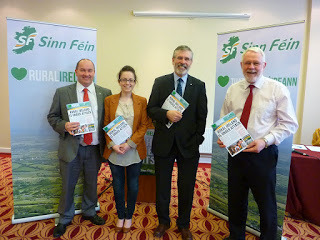
This blog is coming to you today from Castlebar in Mayo. We travelled over yesterday evening. It was a long journey from Dublin. Once off the motorway we travelled through one deserted small town and village after another.
At a time when rural Ireland is under attack Sinn Féin has decided that it's time for a fightback. But it can't be a fightback dictated by people in Dublin or Belfast. It must have its roots firmly in rural Ireland.
So that's what we have decided to do – to go into rural Ireland and speak to those most affected by the policies of austerity which are stripping local communities of essential services – of schools, of guidance counsellors, hospitals, post-offices and Garda stations. The government is also adding new stealth taxes like the Universal Social Charge, the Household Charge, VAT increases, motor tax increases and septic tank charges.
Businesses, shops and pubs in rural towns and villages are closing. Small indigenous businesses, including small farmers, with no real support from the government or credit from the banks, are going under. Our fishing communities are devastated.
All of this and the absence of equality of access to public services threatens the quality of life of people living in rural Ireland.
Castlebar is the first of a series of meetings Sinn Féin will be holding across the state as part of a consultation process with rural Ireland. This morning this blog, Martin Ferris TD and Senators Trevor Ó Clochartaigh and Kathryn Reilly launched the party's "Love Rural Ireland" campaign. Michael Colreavy TD from Leitrim also came along to add his voice to the campaign.
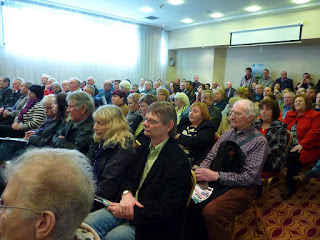
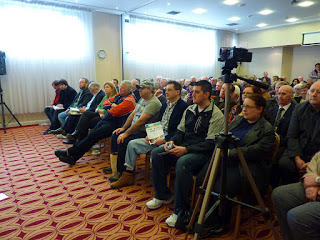 The room was packed. It was standing room only. Over a hundred people came out on a Friday morning to listen to our contributions and to ask questions and make suggestions.
The room was packed. It was standing room only. Over a hundred people came out on a Friday morning to listen to our contributions and to ask questions and make suggestions.Martin and Trevor have been appointed the parties spokespersons on rural Ireland and they will be travelling the length and breadth of the state getting the views, opinions, suggestions and ideas of rural communities.
We thought Mayo was an appropriate place to launch this campaign. It is the Taoiseach's county. It is his policies, as well as those of the last Fianna Fáil one, which are contributing to the crisis in rural Ireland. It is also timely in that this morning the Taoiseach is in Brussels signing up to the austerity treaty.
But Mayo is also Michael Davitt's county. He founded the Land League in this town in 1879.The Land League led the fightback against the exploitation of rural Ireland and the eviction of farmers and their families.
Davitt's slogan was: 'the land of Ireland for the people of Ireland.' He believed that if people stand together there is nothing they cannot accomplish. That lesson is as relevant and necessary today as it was 130 years ago. So, Mayo the birthplace of Michael Davitt is a good place to start the fightback for rural communities which have been betrayed by the government.
Rural Ireland is under attack. Especially here in the west. A whole generation of young people are forced to leave. This GAA generation is playing our gaelic games in Brisbane, Birmingham and Baltimore instead of their own parish. As the social fabric of rural Ireland is undermined there is a growth in isolation, loneliness and suicide.
And this will worsen if the austerity treaty is ratified in the referendum. The Taoiseach signed that Treaty this morning. He wants to hand significant new powers over to the European Court of Justice and the European Commission.
Mr. Kenny is allowing these institutions to impose Thatcherite economic policies on democratically elected governments and to impose heavy fines where they believe these policies have not been adhered to.
And as part of this the Government plans to cut a further €8.6 Billion from the economy in the next three years to meet the Troika Deficit target of 3%. Enda Kenny's and Eamonn Gilmore's austerity treaty demands that this deficit be reduced to a 0.5% target.
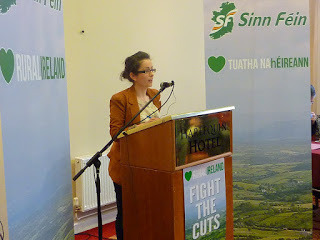
This means that up to a further €6 billion in cuts and new taxes will be imposed! But thankfully the Irish people will have their say. The Irish people cannot afford this Treaty. Sinn Féin will campaign for a No vote. That is the democratic option.
The septic tank issue is one example of the indifference of the government and of policy makers to the needs of rural communities. The Government's septic tank proposals are unfair to rural householders.
This mess belongs to Fianna Fáil, Fine Gael and Labour. They have all been in power over the last 35 years and did nothing to resolve it. Rural dwellers funded their own septic tanks while urban dwellers have a state funded service.
Now to add to this unfairness and in the midst of a recession the government demands that septic tank owners bear the potentially huge cost for upgrading these tanks.
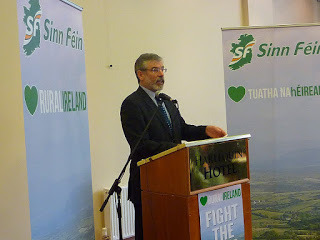
Sinn Féin supports the upgrading of septic tanks. Ground water and the environment must be protected. But to be fair to rural families they cannot bear the cost of this. Grants up to the full cost of upgrading must be available to the households affected.
Enda Kenny gave his word that no citizen would be denied access to public services because of where they live. Then he closed the A&E at Roscommon Hospital. Health services everywhere and public nursing beds are being cut.
Older people and those living on their own or in isolated areas do not feel secure in their homes as gardaí become less visible in rural areas. Poor public transport has always been a problem but the increase in the price of petrol and diesel have made matters worse. Rural roads are getting worse as the funding to local authorities is cut.
There is no doubt that the €30 million being cut from the rural transport scheme will impact on services which many people in rural Ireland, especially our older citizens, depend on.
School transport is being slashed and the cost almost doubled. The small local school is at the heart of most local communities. Rural schools and schools in Gaeltacht areas and Gaeltachtai those specialising in the teaching of the Irish language should be protected and our children's educational future guaranteed. They also are under threat from government policy.
In many ways this is history repeating itself. The Dublin establishment abandoned the people of the north at the time of partition. They also abandoned the people west of the Shannon. Gerry Murray lent me John Healy's 'Nobody shouted stop' book which chronicles that betrayal.
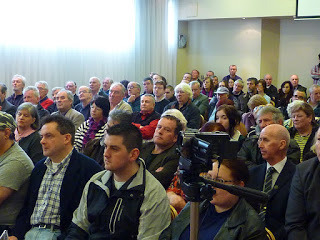
But people here were not broken by that policy. They survived. In 2012 in the run in to 2016 the Irish people deserve better. This is not the Ireland Davitt envisioned. This is not the Ireland proclaimed in the 1916 Proclamation.
This blog wants to commend the people of Mayo and the west who have taken to the streets in defense of their rights. Sinn Féin will stand with them. Sinn Féin will stand up for rural Ireland.
Our vision for our countryside and its people is inseparable from our vision for a new Ireland that embraces all of our people, in all parts of this island, and on the basis of equality.
Republicans are for a new Republic in which citizens have rights – the right to a job; to a home; to a decent standard of education and of health care; the right to live in a safe environment; to equality in the Irish language; and to participate fully in the democratic process.
Many of the values which shape our national character – community, heritage, culture – are drawn from our rural roots.
The Irish republican concept of Comhar na gComharsan, which is based on native Irish traditions going back many centuries, was given expression in the 20th century by a Mayo man, Seamus Ó Mongain of Doohoma, a life long republican and social activist and his friend and comrade Cathal Quinn from Killala. Comhar na gComharsan is about co-operation. It's about people working together in common purpose for a better life.
An older tradition – Meitheal – captures this spirit of good neighbours, especially those in farming communities, coming together in support of each other to cut the hay, or turf, or bring in the crops.
As the seanfhocal says, 'Ar scáth a chéile a mhaireas na daoine' – People live in one another's shelter. Thinking people value this way of life that is unique to rural Ireland.
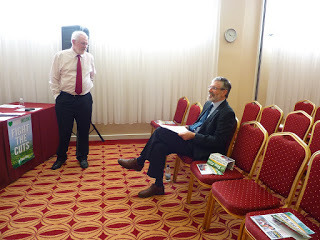
Everyone who loves Ireland needs to stand together in defense of rural Ireland and of your right to equal access to health, education and public services.
Sinn Féin believes that sustainable rural economies, that can offer employment to young people, can be built. We want to ensure that emigration should not be the future for your children.
There needs to be:
• A fair deal for rural households.
• Job opportunities in rural Ireland.
• Protection for rural schools.
• Equal access to health services
• Support for Gaeltacht areas.
In the last Dáil Sinn Féin produced three major Oireachtas reports focusing on rural Ireland:
• Awakening the West – Overcoming Social and Economic Inequality;
• A Report on the Future of Farming and Fishing in the West;
• and a report on Creating Greater Employment in the Agri-food Sector.
In the North we have taken responsibility for the Agriculture and Rural Development Ministry on two occasions.
That is the measure of our commitment to rural Ireland.
So, while it is a time of adversity it is also a time of opportunity.
A lesser people confronted by centuries of colonization, of hardship and occupation, of division and emigration, would have collapsed under the weight of this burden.
The Irish people are made of sterner stuff. We have risen above all of that. And we will not allow this current crisis to break us. We will not allow the golden circle of bankers and bondholders, of developers and corrupt politicians to break us.
We are no mean people. There is a genius in the Irish people. And standing together – like Michael Davitt and the land league before us – we will prevail.
Stand together. Stand united. And there is nothing we cannot achieve.
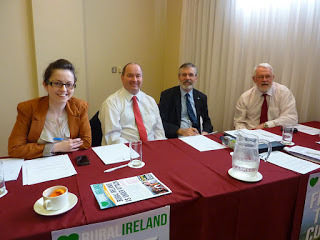
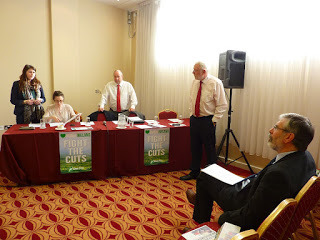
Published on March 02, 2012 12:19
February 29, 2012
The People will have their Say
So, now we know. After months of trying to avoid a referendum on the austerity Treaty – the Fiscal Compact Treaty to the bureaucrats in Brussels – the Taoiseach and the Tanaiste slipped into the Dáil yesterday and told us that there would be a referendum.
This blog wasn't surprised. Sinn Féin had sought our own legal advice. We were told that a referendum was needed. Had the government tried to avoid its responsibilities on this we would have been taking it to court.
It would have been nice to have had more notice about the announcement. The government was apparently told by the Attorney General at the Cabinet meeting that the treaty is a unique instrument outside the EU Treaty architecture and that on balance a referendum is needed to ratify it.
But instead of sharing that information with opposition leaders and setting aside an adequate period of time in the Dáil for this matter to be discussed they phoned around the offices of the opposition leaders shortly before the announcement was made in the chamber at 3pm. We were told that a statement was to be made but not what it would be about.
The government parties had set their faces against a referendum. Media reports out of the EU had confirmed that the government was trying to avoid a referendum and the Tánaiste, speaking at the Joint Oireachtas Committee on European Union Affairs, had also admitted that the government negotiators were actively trying to weaken the text and to put in the words "preferably constitutional" in order to avoid the requirement that it be put to the people.
Having failed on this score the government wanted to make sure that it got its spin in first. Both Kenny and Gilmore had their well prepared scripts available and delivered to the media while opposition spokespersons were responding to the news in the Dáil chamber.
This is another example of the arrogant and discourteous manner in which opposition parties our treated by this government.
The Treaty is due to be signed in Brussels on Thursday. At the end of last November the government nailed its colours to this project and accepted that it was willing to hand over significant new powers to the European Court of Justice and European Commission.
The austerity treaty confers significant new powers on the European Commission and European Court of Justice to compel member states to alter their fiscal and budgetary policies or face significant fines.
This blog believes that the Treaty is anti-growth and anti-jobs and it will impose austerity policies on this state for years to come. This will be bad for those on low and middle incomes and disadvantaged communities. But it is in keeping with a government approach that supports cuts to public services and the privatisation of state assets.
Sinn Féin had consistently argued that there is a democratic imperative on the government to hold a referendum. That will now happen. The people will have their say.
The question is: will the government accept the outcome? Or given the experience with the Lisbon and Nice Treaties will the government refuse to accept a rejection of the Treaty and arrange the usual re-run? Will the government phrase the question in such a way so the people will be able to have an informed debate as opposed to bullying tactics that have been used in the past?
We know that Fianna Fáil will support this. Fianna Fáil and Labour and Fine Gael were all part of the cosy consensus for cuts and this government is dutifully implementing the economic policies of the last Fianna Fáil led government.
I think it is crucially important that the campaign be informed and informative, that the details of the Treaty and its implications for the people of this state and the island be fully discussed and debated.
Sinn Féin is against this Treaty. We have to wait to see the question that will be put. We're against austerity. We don't think it's fair. We don't think it's right.
We don't think it's proper that working people have to pay for the greed and corruption and bad government that led to the economic crisis or the debts created by the golden circle, the big bankers and the bondholders and developers.
So let's have a good debate. Let's have an informed debate. And let's secure a resounding rejection of austerity policies and the hardship they bring with them.
This blog wasn't surprised. Sinn Féin had sought our own legal advice. We were told that a referendum was needed. Had the government tried to avoid its responsibilities on this we would have been taking it to court.
It would have been nice to have had more notice about the announcement. The government was apparently told by the Attorney General at the Cabinet meeting that the treaty is a unique instrument outside the EU Treaty architecture and that on balance a referendum is needed to ratify it.
But instead of sharing that information with opposition leaders and setting aside an adequate period of time in the Dáil for this matter to be discussed they phoned around the offices of the opposition leaders shortly before the announcement was made in the chamber at 3pm. We were told that a statement was to be made but not what it would be about.
The government parties had set their faces against a referendum. Media reports out of the EU had confirmed that the government was trying to avoid a referendum and the Tánaiste, speaking at the Joint Oireachtas Committee on European Union Affairs, had also admitted that the government negotiators were actively trying to weaken the text and to put in the words "preferably constitutional" in order to avoid the requirement that it be put to the people.
Having failed on this score the government wanted to make sure that it got its spin in first. Both Kenny and Gilmore had their well prepared scripts available and delivered to the media while opposition spokespersons were responding to the news in the Dáil chamber.
This is another example of the arrogant and discourteous manner in which opposition parties our treated by this government.
The Treaty is due to be signed in Brussels on Thursday. At the end of last November the government nailed its colours to this project and accepted that it was willing to hand over significant new powers to the European Court of Justice and European Commission.
The austerity treaty confers significant new powers on the European Commission and European Court of Justice to compel member states to alter their fiscal and budgetary policies or face significant fines.
This blog believes that the Treaty is anti-growth and anti-jobs and it will impose austerity policies on this state for years to come. This will be bad for those on low and middle incomes and disadvantaged communities. But it is in keeping with a government approach that supports cuts to public services and the privatisation of state assets.
Sinn Féin had consistently argued that there is a democratic imperative on the government to hold a referendum. That will now happen. The people will have their say.
The question is: will the government accept the outcome? Or given the experience with the Lisbon and Nice Treaties will the government refuse to accept a rejection of the Treaty and arrange the usual re-run? Will the government phrase the question in such a way so the people will be able to have an informed debate as opposed to bullying tactics that have been used in the past?
We know that Fianna Fáil will support this. Fianna Fáil and Labour and Fine Gael were all part of the cosy consensus for cuts and this government is dutifully implementing the economic policies of the last Fianna Fáil led government.
I think it is crucially important that the campaign be informed and informative, that the details of the Treaty and its implications for the people of this state and the island be fully discussed and debated.
Sinn Féin is against this Treaty. We have to wait to see the question that will be put. We're against austerity. We don't think it's fair. We don't think it's right.
We don't think it's proper that working people have to pay for the greed and corruption and bad government that led to the economic crisis or the debts created by the golden circle, the big bankers and the bondholders and developers.
So let's have a good debate. Let's have an informed debate. And let's secure a resounding rejection of austerity policies and the hardship they bring with them.
Published on February 29, 2012 07:26
February 27, 2012
The Constitutional Convention – a route to Uniting Ireland?
Last year, as part of the agreed Programme for Government between Fine Gael and Labour, the two parties agreed to establish a Constitutional Convention to recommend constitutional reform.
Since then this blog has raised this issue regularly in the Dáil with the Taoiseach. I have told him that the Irish diaspora must be represented in the Convention and that part of its agenda must be to discuss extending voting rights in Irish Presidential elections to the diaspora.
In the course of these exchanges the Taoiseach undertook to consult with the opposition parties. He also agreed that the extension of the franchise in Presidential elections to citizens in the north would be part of the convention's agenda.
Despite frequent requests by me to hold the consultation with opposition parties and the Taoiseach's repeated assurances that he would - no meetings were held. In an effort to assist this process I wrote to the Taoiseach on February 7th setting out Sinn Féin's view of the convention and of some of the matters we believed it needed to deal with.
Last week the late evening news on RTE carried a position from the government announcing, without any prior notice to the opposition parties, that the Cabinet had agreed to go ahead with the Convention and that it would consist of 100 members, made up of 66 citizens and 33 political representatives and a chairperson.
The government statement said that the first issues to be discussed would be the reduction of the Presidential term and the voting age, and it then set out a list of other issues to be discussed.
What value a consultation when the government has already decided on the format and terms of reference for the convention?
Fine Gael and Labour spoke often of transparency and accountability and criticised the Fianna Fáil/Green government's way of doing business and then they do the same thing.
The government's unilateral announcement on the Constitutional Convention was cynical. It was an effort by it to set the agenda of the convention and maintain control over it. It is not about inclusiveness and an open debate on the future shape of the constitution but about control.
Similarly with the announcement of the sell-off of state assets, which took place a few days later outside the Dáil, this government is in the business of media spin and control and not concerned with political accountability.
The Taoiseach's office rang my office after the government's announcement and suggested a meeting next week. This is a very unsatisfactory way of discussing this important issue. I will attend but it should be about consultation not merely notification.
Sinn Féin welcomed the proposal to convene a Constitutional Convention, with a view to comprehensive constitutional reform.
In the Dáil and in a letter I wrote to Taoiseach on February 7th I set out Sinn Féin's view of the convention and of those issues which we believe it must address if it is to make a constructive contribution to the Ireland of the 21st century.
In my letter I said that the 'Convention's Terms of Reference must therefore at a minimum both acknowledge and take account of the relevant prior commitments under the Agreement, including provisions regarding the convening of an All-Ireland Parliamentary Forum, an All-Ireland Consultative Civic Forum, and especially the agreement of an All-Ireland Charter of Rights.'
It must also 'consider whether and how the Convention could contribute to the fulfilment of these obligations.'
I also suggested that the Constitutional Convention should be 'able to consider recommending a new constitution for the 21st century which is inclusive, reflects the desire for Irish unity that is shared by the majority of citizens on this island and which protects the rights of citizens, including our unionist neighbours.
The Convention's Terms of Reference must also ensure that the outcome of this current process of constitutional reform does not prejudice any future process of agreeing an all-Ireland constitution - post a referendum on unity as set out in the Good Friday Agreement.'
Sinn Féin believes that the Convention should have specific priorities.
It must be fully inclusive in its composition and its participatory process. This means it must involve in particular; 'the economically disadvantaged; the socially marginalised; citizens from all provinces including northern citizens; ordinary unionists and their official representatives; citizens in the diaspora; and our newest citizens – in addition to the political parties, civil society representatives and those with relevant academic and legal expertise – and ensuring the equal representation of women on the Convention.
The Convention's process must also be fully public, transparent and accountable, from discussion of terms of reference to appointments, and from the debates to conclusion of recommendations. In particular there must be clarity in the Convention's Terms of Reference as to the expected form and effect of its conclusions in relation to the final text, and the process by which this eventually comes before the people in a referendum.'
The Convention should examine the 'need for express guarantees of economic and social rights, the extension of voting rights for northern citizens and citizens in the diaspora, and the architecture necessary to establish a more robustly inclusive, fully representative and accountable democracy with mechanisms for direct participation, in addition to those matters and areas already identified by the Government, which we welcome'.
It is essential that there is the; 'Maximum human rights guarantees. We believe that the inclusion of enumerated rights is absolutely essential for any future constitution, and that it must contain all the modern equality and human rights protections that reflect the full spectrum of our international obligations and any others that are necessary to establish a rights-based society'.
And finally; ' Mindful of the Good Friday Agreement obligation to ensure at minimum the equivalence of human rights protections north and south, but also of the freedom to draft guarantees that exceed the existing standard, the Convention must in its work consider and make a complementary contribution towards an All-Ireland Charter of Rights.'
Embarking on a process of comprehensive constitutional reform is a most serious undertaking which provides a huge opportunity to build the sort of inclusive, equality and rights based society envisaged by the architects of the 1916 Proclamation.
It must not be squandered because of a lack of vision or narrow party political positions.
There is the potential, if managed properly and democratically, to create a durable outcome that can advance reconciliation and peace and prosperity on the island of Ireland and between our people.
Since then this blog has raised this issue regularly in the Dáil with the Taoiseach. I have told him that the Irish diaspora must be represented in the Convention and that part of its agenda must be to discuss extending voting rights in Irish Presidential elections to the diaspora.
In the course of these exchanges the Taoiseach undertook to consult with the opposition parties. He also agreed that the extension of the franchise in Presidential elections to citizens in the north would be part of the convention's agenda.
Despite frequent requests by me to hold the consultation with opposition parties and the Taoiseach's repeated assurances that he would - no meetings were held. In an effort to assist this process I wrote to the Taoiseach on February 7th setting out Sinn Féin's view of the convention and of some of the matters we believed it needed to deal with.
Last week the late evening news on RTE carried a position from the government announcing, without any prior notice to the opposition parties, that the Cabinet had agreed to go ahead with the Convention and that it would consist of 100 members, made up of 66 citizens and 33 political representatives and a chairperson.
The government statement said that the first issues to be discussed would be the reduction of the Presidential term and the voting age, and it then set out a list of other issues to be discussed.
What value a consultation when the government has already decided on the format and terms of reference for the convention?
Fine Gael and Labour spoke often of transparency and accountability and criticised the Fianna Fáil/Green government's way of doing business and then they do the same thing.
The government's unilateral announcement on the Constitutional Convention was cynical. It was an effort by it to set the agenda of the convention and maintain control over it. It is not about inclusiveness and an open debate on the future shape of the constitution but about control.
Similarly with the announcement of the sell-off of state assets, which took place a few days later outside the Dáil, this government is in the business of media spin and control and not concerned with political accountability.
The Taoiseach's office rang my office after the government's announcement and suggested a meeting next week. This is a very unsatisfactory way of discussing this important issue. I will attend but it should be about consultation not merely notification.
Sinn Féin welcomed the proposal to convene a Constitutional Convention, with a view to comprehensive constitutional reform.
In the Dáil and in a letter I wrote to Taoiseach on February 7th I set out Sinn Féin's view of the convention and of those issues which we believe it must address if it is to make a constructive contribution to the Ireland of the 21st century.
In my letter I said that the 'Convention's Terms of Reference must therefore at a minimum both acknowledge and take account of the relevant prior commitments under the Agreement, including provisions regarding the convening of an All-Ireland Parliamentary Forum, an All-Ireland Consultative Civic Forum, and especially the agreement of an All-Ireland Charter of Rights.'
It must also 'consider whether and how the Convention could contribute to the fulfilment of these obligations.'
I also suggested that the Constitutional Convention should be 'able to consider recommending a new constitution for the 21st century which is inclusive, reflects the desire for Irish unity that is shared by the majority of citizens on this island and which protects the rights of citizens, including our unionist neighbours.
The Convention's Terms of Reference must also ensure that the outcome of this current process of constitutional reform does not prejudice any future process of agreeing an all-Ireland constitution - post a referendum on unity as set out in the Good Friday Agreement.'
Sinn Féin believes that the Convention should have specific priorities.
It must be fully inclusive in its composition and its participatory process. This means it must involve in particular; 'the economically disadvantaged; the socially marginalised; citizens from all provinces including northern citizens; ordinary unionists and their official representatives; citizens in the diaspora; and our newest citizens – in addition to the political parties, civil society representatives and those with relevant academic and legal expertise – and ensuring the equal representation of women on the Convention.
The Convention's process must also be fully public, transparent and accountable, from discussion of terms of reference to appointments, and from the debates to conclusion of recommendations. In particular there must be clarity in the Convention's Terms of Reference as to the expected form and effect of its conclusions in relation to the final text, and the process by which this eventually comes before the people in a referendum.'
The Convention should examine the 'need for express guarantees of economic and social rights, the extension of voting rights for northern citizens and citizens in the diaspora, and the architecture necessary to establish a more robustly inclusive, fully representative and accountable democracy with mechanisms for direct participation, in addition to those matters and areas already identified by the Government, which we welcome'.
It is essential that there is the; 'Maximum human rights guarantees. We believe that the inclusion of enumerated rights is absolutely essential for any future constitution, and that it must contain all the modern equality and human rights protections that reflect the full spectrum of our international obligations and any others that are necessary to establish a rights-based society'.
And finally; ' Mindful of the Good Friday Agreement obligation to ensure at minimum the equivalence of human rights protections north and south, but also of the freedom to draft guarantees that exceed the existing standard, the Convention must in its work consider and make a complementary contribution towards an All-Ireland Charter of Rights.'
Embarking on a process of comprehensive constitutional reform is a most serious undertaking which provides a huge opportunity to build the sort of inclusive, equality and rights based society envisaged by the architects of the 1916 Proclamation.
It must not be squandered because of a lack of vision or narrow party political positions.
There is the potential, if managed properly and democratically, to create a durable outcome that can advance reconciliation and peace and prosperity on the island of Ireland and between our people.
Published on February 27, 2012 11:12
February 24, 2012
State assets sell-off a mistake
It's not often this blog gets a chance to step in for the Taoiseach and break news to the Dáil but it was that sort of morning.
For those of you not familiar with the Dáil system we have Leaders Questions each Wednesday morning at 10.30. It's an opportunity for myself and others to quiz Enda Kenny on what we believe to be an issue of importance.
It had been my intention to use my two minutes for a question and one minute for a supplementary to raise the health crisis.
Each day brings new reports of the impact of government cuts on the health service. On Wednesday morning the media was reporting a statement from the Irish Association for Emergency Medicine which revealed that the number of sick children awaiting admission to hospitals and waiting on trolleys has increased by almost 700% in three years. Many children spend longer than 12 hours on a trolley and in some cases more than 24 hours.
Several days earlier the Health Service Executive also revealed that almost 60,000 patients – adults and children - are on waiting lists - a 50% increase on 2010.
And all of this is taking place on Enda Kenny's watch – the same Enda Kenny who five years ago in opposition, and when 41,000 patients were on the waiting list – stood in the Dáil and listed one cutback after another in the health service. He warned that 'patients die at the end of waiting lists because services cannot be provided for them.'
There is a depth of hypocrisy and double standards in this that is breathtaking in its brazenness.
That's what I had wanted to speak to the Taoiseach about. But governments seek to manage news so the Taoiseach and his friends had arranged for the Labour Minister for Public Expenditure and Reform Brendan Howlin TD, to hold a press conference at exactly the same time as Leaders Questions began. The Minister released details on the government's plan to sell-off state assets.
Obviously the purpose was to minimise the chance of any of the opposition leaders raising this issue. It's an old trick and one Enda used to get very angry about when the last government regularly did it to him. Now he's happy to do it to others. But where there is a will there is a way. And when I stood at 10.40 to put my question I had sufficient information to challenge the Taoiseach.
'As we sit here' I said, 'Minister Howlin is in another building announcing the sale of State assets to the tune of €3 billion. And I as a person who has the privilege of leading the Sinn Féin party as part of the Opposition, I must depend on someone sending me a text to tell me this.'
'Is this not a matter that should have come to the chamber for us to discuss?'
It is an indictment of this government that this blog had to give details of this planned sell-off to the chamber instead of Minister Howlin or the Taoiseach. The government was treating the Dáil with discourtesy.
It is also trying to hide its decision to sell-off state assets by claiming that this is part of the agreement with the Troika (the European Commission; the International Monetary Fund and the European Central Bank) and of the bailout.
This is untrue. There is no commitment in the Memorandum of Understanding with the Troika for the sell-off of state assets. Sinn Féin has met with the Troika and they told us that while they believe in privatisation that the Memorandum of Understanding does not bind Fine Gael and Labour to this sell-off of state assets. This is a decision taken by the government.
Claims by the government that this will provide funding for job creation have to be set against the government's decision to give away taxpayers money to unguaranteed bondholders and bad banks, including €3.1 billion to Anglo-Irish bank at the end of March.
The government is selling off successful self-financing state companies such as Bord Gais Éireann's energy business and some elements of ESB's power generation capacity, as well as the possible sale of some assets of Coillte and the states remaining shares in Aer Lingus.
These successful state companies should be part of a job creation strategy that is part and parcel of the solution in creating jobs and delivering growth. They shouldn't be sold off to private interests whose sole interest is profit.
It is a myth that privatisation and deregulation brings competitiveness and efficiency. In reality it was the right wing deregulation strategies of Thatcher and Reagan and others in the 1980s and the growing gap these policies created between the rich and poor which led to the current economic crisis.
The pattern wherever privatisation has been pursued and profitable state companies have been sold off is one of job losses, increased prices for the consumers and big profits for private speculators. Labour should be ashamed of its endorsement of this right wing conservative economic philosophy.
For those of you not familiar with the Dáil system we have Leaders Questions each Wednesday morning at 10.30. It's an opportunity for myself and others to quiz Enda Kenny on what we believe to be an issue of importance.
It had been my intention to use my two minutes for a question and one minute for a supplementary to raise the health crisis.
Each day brings new reports of the impact of government cuts on the health service. On Wednesday morning the media was reporting a statement from the Irish Association for Emergency Medicine which revealed that the number of sick children awaiting admission to hospitals and waiting on trolleys has increased by almost 700% in three years. Many children spend longer than 12 hours on a trolley and in some cases more than 24 hours.
Several days earlier the Health Service Executive also revealed that almost 60,000 patients – adults and children - are on waiting lists - a 50% increase on 2010.
And all of this is taking place on Enda Kenny's watch – the same Enda Kenny who five years ago in opposition, and when 41,000 patients were on the waiting list – stood in the Dáil and listed one cutback after another in the health service. He warned that 'patients die at the end of waiting lists because services cannot be provided for them.'
There is a depth of hypocrisy and double standards in this that is breathtaking in its brazenness.
That's what I had wanted to speak to the Taoiseach about. But governments seek to manage news so the Taoiseach and his friends had arranged for the Labour Minister for Public Expenditure and Reform Brendan Howlin TD, to hold a press conference at exactly the same time as Leaders Questions began. The Minister released details on the government's plan to sell-off state assets.
Obviously the purpose was to minimise the chance of any of the opposition leaders raising this issue. It's an old trick and one Enda used to get very angry about when the last government regularly did it to him. Now he's happy to do it to others. But where there is a will there is a way. And when I stood at 10.40 to put my question I had sufficient information to challenge the Taoiseach.
'As we sit here' I said, 'Minister Howlin is in another building announcing the sale of State assets to the tune of €3 billion. And I as a person who has the privilege of leading the Sinn Féin party as part of the Opposition, I must depend on someone sending me a text to tell me this.'
'Is this not a matter that should have come to the chamber for us to discuss?'
It is an indictment of this government that this blog had to give details of this planned sell-off to the chamber instead of Minister Howlin or the Taoiseach. The government was treating the Dáil with discourtesy.
It is also trying to hide its decision to sell-off state assets by claiming that this is part of the agreement with the Troika (the European Commission; the International Monetary Fund and the European Central Bank) and of the bailout.
This is untrue. There is no commitment in the Memorandum of Understanding with the Troika for the sell-off of state assets. Sinn Féin has met with the Troika and they told us that while they believe in privatisation that the Memorandum of Understanding does not bind Fine Gael and Labour to this sell-off of state assets. This is a decision taken by the government.
Claims by the government that this will provide funding for job creation have to be set against the government's decision to give away taxpayers money to unguaranteed bondholders and bad banks, including €3.1 billion to Anglo-Irish bank at the end of March.
The government is selling off successful self-financing state companies such as Bord Gais Éireann's energy business and some elements of ESB's power generation capacity, as well as the possible sale of some assets of Coillte and the states remaining shares in Aer Lingus.
These successful state companies should be part of a job creation strategy that is part and parcel of the solution in creating jobs and delivering growth. They shouldn't be sold off to private interests whose sole interest is profit.
It is a myth that privatisation and deregulation brings competitiveness and efficiency. In reality it was the right wing deregulation strategies of Thatcher and Reagan and others in the 1980s and the growing gap these policies created between the rich and poor which led to the current economic crisis.
The pattern wherever privatisation has been pursued and profitable state companies have been sold off is one of job losses, increased prices for the consumers and big profits for private speculators. Labour should be ashamed of its endorsement of this right wing conservative economic philosophy.
Published on February 24, 2012 07:59
February 20, 2012
Protecting their class interests
There is an arrogance about this Fine Gael and Labour government, as there was with the last. They talk and think like economists. But unlike good economists who understand the connection between people and the economy, this government doesn't look at the social consequences of its actions and policies.
Do they care about what will happen to pensioners unable to keep their homes warm? Are they are at all interested in the efforts of lone parents to make ends meet on dwindling benefits? Do they worry about children going to school without a warm breakfast or the thousands of families who have had to give up their private health insurance and are now left to the mercies of a public health service in crisis?
There is a fundamental disconnect which allows Fine Gael and Labour deputies in the Dáil to repeatedly vote for policies they know are hurting people and against alternative propositions which can work.
The social consequences are all around them in the cuts to essential public services; the numbers of young people leaving our shores; the cuts to DEIS schools; the slashing of school guidance counsellors; the attack on rural communities through the septic tanks debacle; stealth taxes; the crisis in our health service, and now the imposition of cuts to Community Employment schemes which will in effect see the end of many such schemes.
One news report at the weekend produced new figures that confirmed what many of us have been saying for some time; that the government's austerity taxes are disproportionately impacting on lower and middle income families while those at the other end of the scale are slightly better off.
The figures revealed that anyone earning between €17,542 and €20,000 have seen a 215% increase in their tax and are now paying three times more than they did in 2010.
Those earning between €20,000 and €30,000 are paying 36% more and those earning between €40,000 and €50,000 are paying 23% more.
In stark contrast those earning between €100,000 and €125,000 paid and increase of 6.8% while those between €400,000 and €450,000 paid only 1.1% more.
At the same time at the government is imposing harsh new stealth taxes on low and middle income families it is insisting in handing billions of taxpayers money over to criminal banks – as much as €20 billion last year. Next month €3.1 billion – almost as much as the total the government cut in its pre-Christmas budget – will be paid to Anglo-Irish Bank – a bank that is dead and no longer trades.
People are being squeezed. They can't take anymore. The accumulation of three years of austerity has not fixed the economy but more importantly, it has pushed people too far. And this Government not only plans four more years of the same but has signed up to an Austerity Treaty that will make austerity a legal requirement on any government and impose even more cuts.
That's why hardly a day goes past when one community organisation or another, or group of school children or trade union isn't outside the gates of Leinster House protesting.
Week after week this blog challenges the Taoiseach in the Dáil and other shinners confront his Ministerial colleagues on these vital issues. He and they are immune to the detrimental affects of their decisions.
The same cannot be said about the government party's backbenchers, especially the Labour TDs. They sit and squirm and occasionally shout back but it is clear from their body language that they know their constituency is deeply unhappy with the course of action being pursued by the government.
So, why does the Government believe its economic model and not ours or some other will work?
This is a question which tugs at my mind when common sense, never mind the economic imperative, demands an end to the austerity strategy.
To break it down simply, Enda Kenny and Eamon Gilmore and their friends in Government are for austerity. So too is Fianna Fail.
Their thinking runs like this. There is a deficit. The way to reduce the deficit is to cut spending and increase taxes. They believe the tax to spending cuts ratio must entail more spending cuts. They believe the taxes must be levied across society rather than targeted at high earners. This means low and middle income families taking up the burden of stealth taxes and increases in VAT.
They want spending cuts across all spending areas, rather than targeted at waste etc. They pretend to want to create jobs because they know the public is demanding this but in reality they make no substantial investment available to achieve this. And anyway they believe that the private sector will create the jobs.
Sinn Féin differs from them in many ways but especially in that we do not focus on the deficit alone. We believe the deficit is the result of a crisis. Leaving the causes of that crisis untreated means the crisis won't go away. One cause is a collapse in employment as a result of an economy being built on the back of unsustainable industry, in this case, property. Another is the collapse in the banking sector as a result of corruption and of right wing policies which refused to regulate the banks.
Republicans want to create jobs which in turn will increase the amount of tax going to the state, increase consumer spending (keeping businesses going) and lower social welfare spending. In the meantime, we want a change in the tax system to make it fairer, so we would target high earners, and we want spending waste trimmed.
We also believe that the state should stop paying billions of taxpayers money out to criminal banks.
But for now Fine Gael and Labour are locked into austerity policies. Why. Because they protect their class interests and the status quo.
Do they care about what will happen to pensioners unable to keep their homes warm? Are they are at all interested in the efforts of lone parents to make ends meet on dwindling benefits? Do they worry about children going to school without a warm breakfast or the thousands of families who have had to give up their private health insurance and are now left to the mercies of a public health service in crisis?
There is a fundamental disconnect which allows Fine Gael and Labour deputies in the Dáil to repeatedly vote for policies they know are hurting people and against alternative propositions which can work.
The social consequences are all around them in the cuts to essential public services; the numbers of young people leaving our shores; the cuts to DEIS schools; the slashing of school guidance counsellors; the attack on rural communities through the septic tanks debacle; stealth taxes; the crisis in our health service, and now the imposition of cuts to Community Employment schemes which will in effect see the end of many such schemes.
One news report at the weekend produced new figures that confirmed what many of us have been saying for some time; that the government's austerity taxes are disproportionately impacting on lower and middle income families while those at the other end of the scale are slightly better off.
The figures revealed that anyone earning between €17,542 and €20,000 have seen a 215% increase in their tax and are now paying three times more than they did in 2010.
Those earning between €20,000 and €30,000 are paying 36% more and those earning between €40,000 and €50,000 are paying 23% more.
In stark contrast those earning between €100,000 and €125,000 paid and increase of 6.8% while those between €400,000 and €450,000 paid only 1.1% more.
At the same time at the government is imposing harsh new stealth taxes on low and middle income families it is insisting in handing billions of taxpayers money over to criminal banks – as much as €20 billion last year. Next month €3.1 billion – almost as much as the total the government cut in its pre-Christmas budget – will be paid to Anglo-Irish Bank – a bank that is dead and no longer trades.
People are being squeezed. They can't take anymore. The accumulation of three years of austerity has not fixed the economy but more importantly, it has pushed people too far. And this Government not only plans four more years of the same but has signed up to an Austerity Treaty that will make austerity a legal requirement on any government and impose even more cuts.
That's why hardly a day goes past when one community organisation or another, or group of school children or trade union isn't outside the gates of Leinster House protesting.
Week after week this blog challenges the Taoiseach in the Dáil and other shinners confront his Ministerial colleagues on these vital issues. He and they are immune to the detrimental affects of their decisions.
The same cannot be said about the government party's backbenchers, especially the Labour TDs. They sit and squirm and occasionally shout back but it is clear from their body language that they know their constituency is deeply unhappy with the course of action being pursued by the government.
So, why does the Government believe its economic model and not ours or some other will work?
This is a question which tugs at my mind when common sense, never mind the economic imperative, demands an end to the austerity strategy.
To break it down simply, Enda Kenny and Eamon Gilmore and their friends in Government are for austerity. So too is Fianna Fail.
Their thinking runs like this. There is a deficit. The way to reduce the deficit is to cut spending and increase taxes. They believe the tax to spending cuts ratio must entail more spending cuts. They believe the taxes must be levied across society rather than targeted at high earners. This means low and middle income families taking up the burden of stealth taxes and increases in VAT.
They want spending cuts across all spending areas, rather than targeted at waste etc. They pretend to want to create jobs because they know the public is demanding this but in reality they make no substantial investment available to achieve this. And anyway they believe that the private sector will create the jobs.
Sinn Féin differs from them in many ways but especially in that we do not focus on the deficit alone. We believe the deficit is the result of a crisis. Leaving the causes of that crisis untreated means the crisis won't go away. One cause is a collapse in employment as a result of an economy being built on the back of unsustainable industry, in this case, property. Another is the collapse in the banking sector as a result of corruption and of right wing policies which refused to regulate the banks.
Republicans want to create jobs which in turn will increase the amount of tax going to the state, increase consumer spending (keeping businesses going) and lower social welfare spending. In the meantime, we want a change in the tax system to make it fairer, so we would target high earners, and we want spending waste trimmed.
We also believe that the state should stop paying billions of taxpayers money out to criminal banks.
But for now Fine Gael and Labour are locked into austerity policies. Why. Because they protect their class interests and the status quo.
Published on February 20, 2012 12:28
February 14, 2012
Jobs Action Plan deeply flawed
At the start of the week the Taoiseach finally launched his 'Jobs Action Plan'. Today this blog asked the Taoiseach to specify clearly the number of citizens he expects this plan will have taken off the live register by March, or June or September or by year's end?
He couldn't answer the question. Why? Because the Taoiseach's 'Plan' contains no new money to create jobs, and no meaningful targets to judge it by or to aim for.
While I welcome the Governments renewed focus on the Jobs crisis and the Taoiseach's decision to take personal responsibility for delivering on this plan, there is a serious flaw in the government's approach to tackling the economic crisis and in particular the creation of jobs.
This is because the government is locked into an austerity programme that is about cutting jobs and funding from the public sector, and is driving down growth through stealth taxes.
Since the Government came to power a year ago there has been a consistent increase in the number of citizens on the live register in county Louth. In January this figure reached 17,775.
There has also been a slight increase in the number of under 25s on the live register in recent months.
This figure would have been much worse but for the 6,000 citizens, mainly young people, who are immigrating each month across the state, including from Louth.
Across the state there are 440,000 people on the Live Register. 200,000 people (an increase in 14.5% over the year) have been unemployed for a year or more.
Business insolvency has increased with over 1640 businesses going under in the last year. This an increase in 7% over the year. These companies leave behind €1.1 billion in debt.
The government's response to this has been to cut, cut and cut. In 2009 Enterprise Ireland received €359.49 million. This year its budget has been reduced to €307.8 million - a reduction of 14.3% over four years.
In 2009 City and County Enterprise Boards received €21.67 million. This year they are set to receive €15 million - a reduction of 30% over four years.
The IDAs funding has been cut by €10 million from last years budget.
It should also be remembered that although Foreign Direct Investment is important, over 72% of our employment is in small and micro sized industries.
The total amount invested by the government in the IDA, Enterprise Ireland and Enterprise Boards for this year will be less than half a billion euro.
In stark contrast next month the Anglo Irish Promissory note will cost the people of this state €3.1 billion.
This is the contradiction at the heart of the government's approach to this jobs crisis. You cannot stick to austerity policies, which are further depressing the economy, pushing down growth and restricting its ability to stimulate the economy, while also claiming to have a meaningful policy to create jobs! It won't work.
The government is also engaging in smoke and mirrors by producing job plans that it has launched before – some of them several times. For example, the government has again launched a Micro Finance Loan Fund. This is a much needed initiative but it has been announced now on four occasions and is still not operational after a year.
It is worth noting that the EU PROGRESS MICRO ENTERPRISE Fund has been running since June and Business can avail of up to €25k. The overall programme is worth €200million. This programme needs a sponsor in this state i.e. bank or the credit union sector. The Government has yet to put this in place.
The same approach has been taken by the government to the 'Temporary Partial Credit Guarantee Scheme'. This too has now been announced four times and is still not operational.
What is needed is a different economic strategy which puts citizens first and invests in jobs and growth. In our pre-budget submission Sinn Féin set out a €3.5 billion package of new measures to close the deficit in 2012. This contained a €7 billion jobs stimulus package and a €596 million household stimulus package.
It focussed on job creation, on non-deflationary taxes for those who can afford them, on slashing public spending waste instead of frontline services, and on placing the needs of the Irish people above the needs of banks and bondholders.
This is a costed route by which the economy of this state can be put back on track without imposing hardship on low and middle income families."
He couldn't answer the question. Why? Because the Taoiseach's 'Plan' contains no new money to create jobs, and no meaningful targets to judge it by or to aim for.
While I welcome the Governments renewed focus on the Jobs crisis and the Taoiseach's decision to take personal responsibility for delivering on this plan, there is a serious flaw in the government's approach to tackling the economic crisis and in particular the creation of jobs.
This is because the government is locked into an austerity programme that is about cutting jobs and funding from the public sector, and is driving down growth through stealth taxes.
Since the Government came to power a year ago there has been a consistent increase in the number of citizens on the live register in county Louth. In January this figure reached 17,775.
There has also been a slight increase in the number of under 25s on the live register in recent months.
This figure would have been much worse but for the 6,000 citizens, mainly young people, who are immigrating each month across the state, including from Louth.
Across the state there are 440,000 people on the Live Register. 200,000 people (an increase in 14.5% over the year) have been unemployed for a year or more.
Business insolvency has increased with over 1640 businesses going under in the last year. This an increase in 7% over the year. These companies leave behind €1.1 billion in debt.
The government's response to this has been to cut, cut and cut. In 2009 Enterprise Ireland received €359.49 million. This year its budget has been reduced to €307.8 million - a reduction of 14.3% over four years.
In 2009 City and County Enterprise Boards received €21.67 million. This year they are set to receive €15 million - a reduction of 30% over four years.
The IDAs funding has been cut by €10 million from last years budget.
It should also be remembered that although Foreign Direct Investment is important, over 72% of our employment is in small and micro sized industries.
The total amount invested by the government in the IDA, Enterprise Ireland and Enterprise Boards for this year will be less than half a billion euro.
In stark contrast next month the Anglo Irish Promissory note will cost the people of this state €3.1 billion.
This is the contradiction at the heart of the government's approach to this jobs crisis. You cannot stick to austerity policies, which are further depressing the economy, pushing down growth and restricting its ability to stimulate the economy, while also claiming to have a meaningful policy to create jobs! It won't work.
The government is also engaging in smoke and mirrors by producing job plans that it has launched before – some of them several times. For example, the government has again launched a Micro Finance Loan Fund. This is a much needed initiative but it has been announced now on four occasions and is still not operational after a year.
It is worth noting that the EU PROGRESS MICRO ENTERPRISE Fund has been running since June and Business can avail of up to €25k. The overall programme is worth €200million. This programme needs a sponsor in this state i.e. bank or the credit union sector. The Government has yet to put this in place.
The same approach has been taken by the government to the 'Temporary Partial Credit Guarantee Scheme'. This too has now been announced four times and is still not operational.
What is needed is a different economic strategy which puts citizens first and invests in jobs and growth. In our pre-budget submission Sinn Féin set out a €3.5 billion package of new measures to close the deficit in 2012. This contained a €7 billion jobs stimulus package and a €596 million household stimulus package.
It focussed on job creation, on non-deflationary taxes for those who can afford them, on slashing public spending waste instead of frontline services, and on placing the needs of the Irish people above the needs of banks and bondholders.
This is a costed route by which the economy of this state can be put back on track without imposing hardship on low and middle income families."
Published on February 14, 2012 22:45
February 12, 2012
Freedom is shaped by people
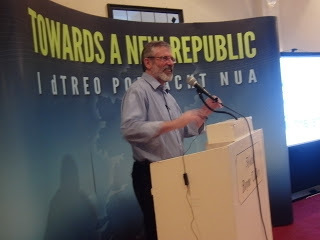
Last Friday was spent in the Boyne Valley Hotel in Drogheda where key leadership activists from all levels of Sinn Féin and from all parts of the island, Britain, and the USA came together to discuss the party's strategy of building toward a united Ireland.
This blog had the honour of opening the day's proceedings before several keynote speakers set out the multiplicity of tasks before us. Martin McGuinness, Mary Lou McDonald, Caral Ní Chuilin and Lucilita Bhreatnach who has the onerous task of leading our uniting Ireland project, were among those taking part in the workshops and discussions.
The 'away day' took place after a very successful conference in the Millennium Forum in Derry. Almost 1000 people, including a sizeable section of unionist opinion, attended that event. The Millennium conference was the sixth in a series that have attracted large numbers of people from every walk of life to capacity packed halls in Monaghan, Dublin, Cork, Galway, Newry and Derry.
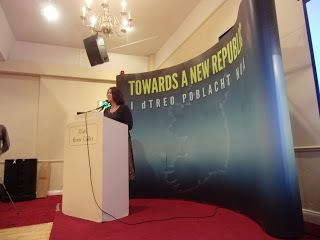
Uniting Ireland is Sinn Féin's key political objective. The Good Friday Agreement and the all-Ireland political institutions are an important step in this direction but more effort is needed.
Suffice to say there are many difficulties and challenges facing us but this blog believes there are also many, many opportunities.
Republicans need to have the confidence to rise to these challenges and to seize the opportunities to advance our cause.
We are republicans, we are socialist republicans. We want to see that type of society shaped on this island. We can't get that until we get rid of partition. Partition has failed the people of Ireland, north and south, the unionists and the rest of us.
A new agreed Ireland based on the rights of citizens is needed. This is best achieved by unity through reconciliation. That means building on the progress that has been made toward uniting Ireland.
So, this isn't just an emotional or patriotic or inspirational dream that we have. This is a very hardnosed realisable objective as part of that process of building a new republic.
It is worth going back to read Tone. Read Connolly and Pearse. Take a half an hour and read what Bobby Sands wrote about these big issues.
What they all had in common, and Connolly famously talked about the re-conquest of Ireland by the Irish people, is a recognition that we can't free Ireland. An elite, a vanguard cannot free Ireland. Obviously there is work for a vanguard. The people who take the initiatives; who take the chances; who make the sacrifices; and who go on the offence, can create the political conditions for change.
But the only true freedom of people is when people shape that for themselves. So this is the big democratic phase of our struggle.
It's also worth reminding ourselves that this isn't 1798. This isn't 1916. This isn't 1981. So what did all these men and women have in common with us?
They took these core principles of republicanism and they modernised them and made them relevant to their own times. That's what we have to do – we have to take the core values of our political ethos and make them relevant to our time.
That's what Friday's meeting was about.
The fact is Sinn Féin is still too small. Republicans therefore have to punch above our weight. We have to find ways to get the maximum effect, of making the maximum contribution, while at the same time we have to build capacity; build the party; educate; and recruit and fundraise. We have to build the necessary critical mass of activism to make a difference in a very positive way.
We also need cohesion. We need joined-up-ness. We need political integration across the island, from the national down to the local of all of our structures, our programmes of work and our agendas.
We also need to tap into the international good will. Sinn Féin and the broad republican struggle enjoy huge support, sympathy, affection and admiration from progressive people throughout the world, not least in our own diaspora, and it is not limited to our own diaspora. Wherever people struggle for freedom they know about Ireland.
As well as doing all these things we also need time to think. That's what today's about. It's about arguing; it's about debating; it's about strategising; it's about finding ways for us to integrate our uniting Ireland project into our daily work.
Wherever that work is the uniting Ireland objective and process must be part of it. This has to become as natural to us as breathing.
A new structure is in place within the party leadership to drive this project. So we will continue to come forward with initiatives, events, publications and so on but that has to be integrated into the party as well.
The key objective is to turn the broad emotional, in many cases passive, support for Irish unity, into core political commitment. It's also to win over a section of unionist opinion and persuade them that Irish unity serves their interests better than partition.
So, Friday's conference was about raising awareness about how the party integrates this big historic project into our work and to agree a consensus around a number of big things that we can do in the upcoming period.
It was a good days work but only the beginning. There will be other 'away days' as this process of integration and cohesion moves up a gear. If you are interested in joining this endeavour than join Sinn Féin and help complete the work of Tone and Emmet, of McCracken and Pearse and Connolly and Sands and Farrell.
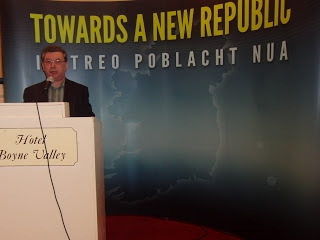
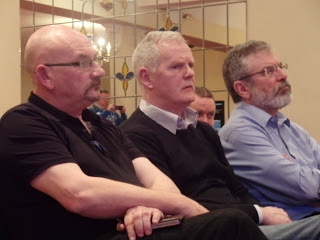
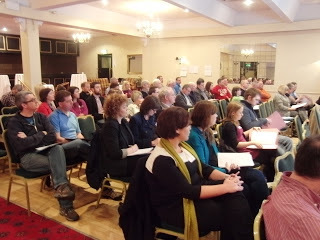
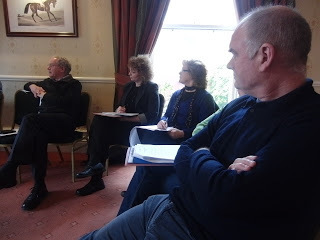
Published on February 12, 2012 19:32
February 4, 2012
Demand a referendum
In his television address on December 4th, just prior to the budget, the Taoiseach said:
"I want to be the Taoiseach who retrieves Ireland's economic sovereignty, and who leads a Government that will help our country to succeed."
Yet last Monday this same Taoiseach signed up to an austerity treaty that hands significant new powers over to the European Court of Justice and European Commission to impose economic policies on democratically elected governments and to impose heavy fines where they believe these policies have not been adhered to.
How can he claim to be for restoring sovereignty while giving away important Irish fiscal and budgetary powers to unelected bureaucrats, and at the same time refusing the people their right to vote on an issue that will significantly affect their lives for years to come?
The austerity treaty confers significant new powers on the European Commission and European Court of Justice to compel member states to alter their fiscal and budgetary policies or face significant fines.
The Treaty is anti-growth and anti-jobs.
If ratified, it will place an economic straight jacket on this state for decades.
Its debt and deficit limits are draconian and will mean decades of austerity imposed on a people crying out for investment in jobs and growth.
No one should be surprised by the Taoiseach's support for the Treaty. He has long advocated cuts to public services and stealth taxes as the way of tackling the financial crisis.
In addition it is abundantly clear that fearful of the anger of the Irish people to this strategy the government negotiated a treaty text that would avoid the necessity to hold a referendum.
A high level EU official confirmed this in the Irish Times on Wednesday.
So too did the Tánaiste, speaking at the Joint Oireachtas Committee on European Union Affairs. He confirmed that government negotiators actively sought to weaken that text and to put in the words "preferably constitutional" in order to avoid the requirement to put this proposition before the people.
But rather than face up to this and tell the public the truth the Taoiseach and his colleagues are now passing the buck to a cabinet colleague – the Attorney General – to decide whether a referendum is necessary. They already know the answer. They negotiated a treaty text to avoid a referendum!!!
This is one time when TDs and Seanadóirí from the every party and none need to put the people above party self-interest and come out publicly to demand a referendum.
This blog believes that if it is ratified this austerity treaty will have a profound and adverse impact on the Irish economy and people for decades to come.
Thursday saw the Irish Central Bank downgrade the growth forecast for 2012 by 1.3%. This is the sixth downgrade of Irish growth forecasts for 2012.
Thursday's figures represent a serious challenge to the government. The Minister for Finance is on the record in response to questions from Pearse Doherty that a 1% reduction in GDP as a rule would see a loss of €800 million in revenue from the state.
This may well force the government to introduce a mini budget to make more cuts.
It already plans to cut €8.6 Billion from the economy in the next three years to meet the Troika Deficit target of 3%. Monday's austerity treaty demands that this be reduced to a 0.5% target. This is predicted to mean a further €6 billion in cuts and new taxes!!
What is needed is a strategy for jobs and growth through stimulus.
The summit noted that there are 23 million citizens unemployed across the EU but not one additional cent has been allocated to job creation.
But there are solutions.
Sinn Féin is for:
Investment in jobs and growth. We have a National Pensions Reserve Fund with €5.3 billion. Combine this to the resources of the European Investment Bank and utilise that to invest in various projects, for example, the roll-out of next generation broadband.
Cleanse the European Banking system of toxic debts through a new round of rigorous stress tests and deleveraging followed by recapitalisation where necessary funded by the European Central Bank.
There should be debt-restructuring agreements for over indebted economies involving debt-write-downs to assist them return to debt-sustainability. This would allow the state to end the €3.1 billion annual payment to Anglo which will cost the Irish taxpayers up to €76 billion before it concludes in 20 years.
Within existing EU treaty provisions the European Council must ensure that the European Central Bank takes all necessary action to stabilise sovereign bond interest rates and ensure market access for all member states.
On the day after the treaty was agreed the EU released its youth unemployment statistics. Nearly one third of young people in Ireland and almost half of Spanish young people out of work.
Thousands of young people have to leave the State every week to try to make a living elsewhere.
This austerity treaty will only make this dire situation worse.
Demand a referendum.
"I want to be the Taoiseach who retrieves Ireland's economic sovereignty, and who leads a Government that will help our country to succeed."
Yet last Monday this same Taoiseach signed up to an austerity treaty that hands significant new powers over to the European Court of Justice and European Commission to impose economic policies on democratically elected governments and to impose heavy fines where they believe these policies have not been adhered to.
How can he claim to be for restoring sovereignty while giving away important Irish fiscal and budgetary powers to unelected bureaucrats, and at the same time refusing the people their right to vote on an issue that will significantly affect their lives for years to come?
The austerity treaty confers significant new powers on the European Commission and European Court of Justice to compel member states to alter their fiscal and budgetary policies or face significant fines.
The Treaty is anti-growth and anti-jobs.
If ratified, it will place an economic straight jacket on this state for decades.
Its debt and deficit limits are draconian and will mean decades of austerity imposed on a people crying out for investment in jobs and growth.
No one should be surprised by the Taoiseach's support for the Treaty. He has long advocated cuts to public services and stealth taxes as the way of tackling the financial crisis.
In addition it is abundantly clear that fearful of the anger of the Irish people to this strategy the government negotiated a treaty text that would avoid the necessity to hold a referendum.
A high level EU official confirmed this in the Irish Times on Wednesday.
So too did the Tánaiste, speaking at the Joint Oireachtas Committee on European Union Affairs. He confirmed that government negotiators actively sought to weaken that text and to put in the words "preferably constitutional" in order to avoid the requirement to put this proposition before the people.
But rather than face up to this and tell the public the truth the Taoiseach and his colleagues are now passing the buck to a cabinet colleague – the Attorney General – to decide whether a referendum is necessary. They already know the answer. They negotiated a treaty text to avoid a referendum!!!
This is one time when TDs and Seanadóirí from the every party and none need to put the people above party self-interest and come out publicly to demand a referendum.
This blog believes that if it is ratified this austerity treaty will have a profound and adverse impact on the Irish economy and people for decades to come.
Thursday saw the Irish Central Bank downgrade the growth forecast for 2012 by 1.3%. This is the sixth downgrade of Irish growth forecasts for 2012.
Thursday's figures represent a serious challenge to the government. The Minister for Finance is on the record in response to questions from Pearse Doherty that a 1% reduction in GDP as a rule would see a loss of €800 million in revenue from the state.
This may well force the government to introduce a mini budget to make more cuts.
It already plans to cut €8.6 Billion from the economy in the next three years to meet the Troika Deficit target of 3%. Monday's austerity treaty demands that this be reduced to a 0.5% target. This is predicted to mean a further €6 billion in cuts and new taxes!!
What is needed is a strategy for jobs and growth through stimulus.
The summit noted that there are 23 million citizens unemployed across the EU but not one additional cent has been allocated to job creation.
But there are solutions.
Sinn Féin is for:
Investment in jobs and growth. We have a National Pensions Reserve Fund with €5.3 billion. Combine this to the resources of the European Investment Bank and utilise that to invest in various projects, for example, the roll-out of next generation broadband.
Cleanse the European Banking system of toxic debts through a new round of rigorous stress tests and deleveraging followed by recapitalisation where necessary funded by the European Central Bank.
There should be debt-restructuring agreements for over indebted economies involving debt-write-downs to assist them return to debt-sustainability. This would allow the state to end the €3.1 billion annual payment to Anglo which will cost the Irish taxpayers up to €76 billion before it concludes in 20 years.
Within existing EU treaty provisions the European Council must ensure that the European Central Bank takes all necessary action to stabilise sovereign bond interest rates and ensure market access for all member states.
On the day after the treaty was agreed the EU released its youth unemployment statistics. Nearly one third of young people in Ireland and almost half of Spanish young people out of work.
Thousands of young people have to leave the State every week to try to make a living elsewhere.
This austerity treaty will only make this dire situation worse.
Demand a referendum.
Published on February 04, 2012 17:24
Gerry Adams's Blog
- Gerry Adams's profile
- 29 followers
Gerry Adams isn't a Goodreads Author
(yet),
but they
do have a blog,
so here are some recent posts imported from
their feed.



